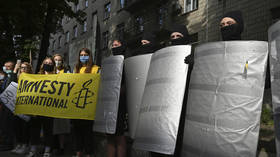Singapore investigates 17 Covid-19 reinfections, quarantines 1,200 migrant workers
The Singaporean authorities have moved 1,200 migrant workers from their dormitory to a quarantine facility after coronavirus cases were identified. There were 17 cases found in workers who had previously recovered from the virus.
It was reported on Thursday that 17 cases of Covid-19 have been found in migrant workers in Singapore who have previously recovered from the virus. Health authorities are investigating how the reinfections occurred, and whether the individuals are persistent shedders from their earlier infection.
The 1,200 individuals, mainly South Asian low-wage laborers, were put into quarantine on Tuesday after one worker was found to be positive for the virus. The first worker to test positive had received his second shot of a Covid-19 vaccine the week before.
Health authorities said there was no evidence yet that the cases were linked to the new India double-mutant variant, but the government has blocked entry to Singapore for anyone who has recently been to India, including long-term visa holders.
"Even though these workers would have served the stay home notice before they start work, there is still a risk that a leak may happen, and cause another wave of infection in the dormitories," the health ministry said.
Also on rt.com Don’t dangle your dongle near me: Singapore tests Bluetooth devices to enforce Covid safe-distance rules at business conferenceThe majority of Singapore’s 60,000 Covid-19 cases have occurred among its migrant worker population, which in turn has triggered a number of forced quarantines at their dormitories.
Earlier on Thursday, reports suggested that Singapore and Hong Kong had called off plans to implement a travel bubble between the two financial centers. This was later confirmed by the transport ministry. An attempt to implement the plan was also called off in December after a spike in cases in Hong Kong.
Both Singapore and Hong Kong have registered comparatively low levels of Covid-19 prevalence since the start of the pandemic, although vaccination rates remain low.
If you like this story, share it with a friend!














